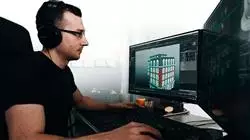University certificate
The world's largest faculty of video games”
Introduction to the Program
Develop the engines of the next successful video games thanks to this Postgraduate certificate”

For Video Game fans, there are a number of elements that can be easily perceived and analyzed. These issues are mainly focused on their visual aspects. Therefore, they can appreciate the design, graphics or animations. But there is something without which all that could not be so valued, because it would not have the structure on which to settle: the Video Game Engines.
An engine includes the way the video game works, how the characters will move, what kind of scenarios they will be in, how the user participates and enjoys the game, and other elements related to its mechanics. Therefore, the engine is basic: without it there would be no great video games today.
For this reason, this Postgraduate certificate in Video Game Engines is a great opportunity for students to become high-level professionals in the industry. This program provides the knowledge and skills necessary to develop Video Game Engines, so that students can make their way in the industry and progress to success.
Companies are looking for specialists in video game engine development. Think no more and study this course with us”
This Postgraduate certificate in Video Game Engines contains the most complete and up-to-date educational program on the market. The most important features include:
- Practical cases presented by experts in video game development
- The graphic, schematic, and practical contents with which they are created, provide scientific and practical information on the disciplines that are essential for professional practice
- Practical exercises where self-assessment can be used to improve learning
- Special emphasis on innovative methodologies
- Theoretical lessons, questions to the expert, debate forums on controversial topics, and individual reflection work
- Content that is accessible from any fixed or portable device with an Internet connection
Without good engines, video games wouldn’t be successful. You will be essential to your company when you complete this”
The teaching staff of this program includes professionals from the industry, who contribute the experience of their work to this program, in addition to recognized specialists from reference societies and prestigious universities.
The multimedia content, developed with the latest educational technology, will provide the professional with situated and contextual learning, i.e., a simulated environment that will provide immersive learning programmed to learn in real situations.
This program is designed around Problem-Based Learning, whereby the professional must try to solve the different professional practice situations that arise throughout the program. For this purpose, the student will be assisted by an innovative interactive video system created by renowned and experienced experts.
The industry is expanding and needs great professionals like you"

Specialization is key for working in the field of video games"
Syllabus
The contents of this Postgraduate certificate in Video Game Engines have been structured in a module composed of 10 topics, along which all the keys about Videogame Engines will be covered in order to make students great experts in the field. Furthermore, these contents have been designed by great experts who know the industry to perfection, so students will be able to apply everything they learn directly in their professional fields.

These are the contents you were looking for to specialize in Video Game Engines”
Module 1. Computer Graphics
1.1. Computer Graphics Overview
1.1.1. Computer Graphics Applications and Uses
1.1.2. Computer Graphics History
1.1.3. Basic Algorithms for 2D Graphics
1.1.4. 3D Transformations: Projections and Perspectives
1.2. Mathematical and Physical Basis for Simulations and Textures
1.2.1. Light Rays
1.2.2. Absorption and Scattering
1.2.3. Specular and Diffuse Reflection
1.2.4. Color
1.2.5. Bidirectional Reflectance Distribution Function (BRDF) Color
1.2.6. Energy Conservation and Fresnel F0 Effect
1.2.7. Key Features of Physically Based Rendering (PBR)
1.3. Image Representation: Nature and Format
1.3.1. Introduction: Theoretical Basis
1.3.2. Size of the Digital Image: Resolution and Color
1.3.3. Uncompressed Image Formats
1.3.4. Compressed Image Formats
1.3.5. Color Spaces
1.3.6. Levels and Curves
1.4. Image Representation: Texture
1.4.1. Procedural Textures
1.4.2. Quixel Megascans: Scanning Textures
1.4.3. Texture Baking
1.4.4. Normal Mapping and Displacement
1.4.5. Albedo, Metallic and Roughness Maps
1.5. Rendering Scenes: Visualization and Lighting
1.5.1. Light Direction
1.5.2. Contrast
1.5.3. Saturation
1.5.4. Color
1.5.5. Direct and Indirect Light
1.5.6. Hard and Soft Light
1.5.7. Importance of Shading: Basic Rules and Types
1.6. Rendering Hardware Evolution and Performance
1.6.1. The 70’s: The Advent of First 3D Modeling and Rendering Software
1.6.2. Architectural Orientation
1.6.3. The 90’s: Development of Current 3D Software
1.6.4. 3D Printing
1.6.5. VR Equipment for 3D Visualization
1.7. 2D Graphics Software Analysis
1.7.1. Adobe Photoshop
1.7.2. Gimp
1.7.3. Krita
1.7.4. Inkscape
1.7.5. Pyxel Edit
1.8. 3D Modeling Software Analysis
1.8.1. Autodesk Maya
1.8.2. Cinema 4D
1.8.3. Blender
1.8.4. ZBrush
1.8.5. SketchUp
1.8.6. Computer-Aided Design (CAD) Software
1.9. 3D Texturing Software Analysis
1.9.1. Procedural Texturing in Maya
1.9.2. Procedural Texturing in Blender
1.9.3. Baking
1.9.4. Substance Painter and Substance Designer
1.9.5. ArmorPaint
1.10. 3D Texturing Software Analysis
1.10.1. Arnold
1.10.2. Cycles
1.10.3. Vray
1.10.4. IRay
1.10.5. Real-Time Rendering: Marmoset Toolbag
Module 2. Video Game Engines
2.1. Video Games and Information Communication Technologies (ICTs)
2.1.1. Introduction
2.1.2. Opportunities
2.1.3. Challenges
2.1.4. Conclusions
2.2. History of Video Game Engines
2.2.1. Introduction
2.2.2. Atari
2.2.3. The 80s
2.2.4. First Engines: The 90s
2.2.5. Current Engines
2.3. Video Game Engines
2.3.1. Types of Engines
2.3.2. Video Game Engine Parts
2.3.3. Current Engines
2.3.4. Selecting an Engine for Our Project
2.4. Motor Game Maker
2.4.1. Introduction
2.4.2. Scenarios Design
2.4.3. Sprites and Animations
2.4.4. Collisions
2.4.5. Scripting in Game Maker Languages (GML)
2.5. Unreal Engine 4: Introduction
2.5.1. What Is Unreal Engine 4? What Is Its Philosophy?
2.5.2. Materials
2.5.3. UI
2.5.4. Animations
2.5.5. Particle Systems
2.5.6. Artificial Intelligence
2.5.7. Frames Per Second (FPS)
2.6. Unreal Engine 4: Visual Scripting
2.6.1. Blueprints and Visual Scripting Philosophy
2.6.2. Debugging
2.6.3. Types of Variables
2.6.4. Basic Flow Control
2.7. Unity 5 Engine
2.7.1. C# and Visual Studio Programming
2.7.2. Creating Prefabs
2.7.3. Using Gizmos to Control Video Games
2.7.4. Adaptive Engine: 2D and 3D
2.8. Godot Engine
2.8.1. Godot Design Philosophy
2.8.2. Object- and Composition-Oriented Design
2.8.3. All in One Package
2.8.4. Open and Community-Driven Software
2.9. RPG Maker Engine
2.9.1. RPG Maker Philosophy
2.9.2. Taking as a Reference
2.9.3. Creating a Game with Personality
2.9.4. Commercially Successful Games
2.10. Source 2 Engine
2.10.1. Source 2 Philosophy
2.10.2. Source and Source 2: Evolution
2.10.3. Use of the Community: Audiovisual Content and Video Games
2.10.4. Future of Source 2 Engine
2.10.5. Successful Mods and Games

Learn everything about Video Game Engines and become a great expert”
Postgraduate Certificate in Video Game Engines.
.
If you've ever dreamed of creating your own video games and immersing yourself in the interactive entertainment industry, TECH Global University has the perfect opportunity for you. Our exciting online Video Game Engine Postgraduate Certificate will give you the skills and knowledge you need to develop your own games and bring your ideas to reality. Discover how this 1-3 month Postgraduate Certificate can be the starting point of your career in the video game development industry. This Postgraduate Certificate adapts to your pace of life thanks to its virtual mode. You will be able to access classes from anywhere and at any time, allowing you to balance your studies with other responsibilities. You will also have additional resources, such as online tutorials and hands-on projects, to help you apply your knowledge and develop your skills in a practical way.
Explore the fascinating world of video games with our virtual classes.
At TECH Global University, we are passionate about the world of video games and we want to share that passion with you. Our Video Game Engines Postgraduate Certificate is designed to give you a solid foundation in game development using the most popular engines in the industry. Through interactive virtual classes, you will learn how to use key tools and techniques to create immersive environments, characters and game mechanics. Our team of game development experts will guide you through this intensive Postgraduate Certificate, sharing their experience and expertise in game creation. You will learn how to use leading game engines, such as Unity and Unreal Engine, to bring your ideas to life and build stunning game experiences. Don't miss this opportunity to turn your passion for video games into an exciting career - sign up today and start creating your own innovative games!""







